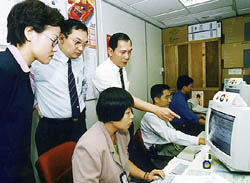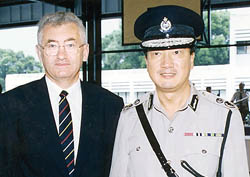



















 TOMS Division members testing the system before roll-out |
TRAFFIC Operations and Management System(TOMS) goes live in November, at which time officers working in Regional Traffic Formations and Traffic Branch Headquarters become members of TOMS, sharing the benefit of modern information technology. TOMS is an extension to the Communal Information System (CIS) which is presently comprised of FICS and RICS. Apart from inheriting all the existing functions of CIS, TOMS has its own built-in functions which are new and tailor-made to cater for the unique operation of Regional Traffic Formations. |
|
Superintendent Denys Chan Wing-hong of TOMS Division, Information System Wing, said: "There is a distinctive difference between the role of traffic officers and ordinary UB officers. Traffic officers are specially trained to handle all types of vehicle-related incidents and TOMS is designed to cater for their needs with various prominent functions for the processing of details from VALID III, the printing of different traffic reports including Pol 287, the interface with TRADS and, in particular, the operation of the vehicle detention pound." Chief Inspector Simon Ip Chung-nin is the officer-in-charge of the TOMS implementation. With his past experience in traffic, he sees the impact of TOMS to the operation of traffic formations as phenomenal, especially in the field of accident investigations. "TOMS" will bring significant changes to the current procedures of traffic operations and management," CIP Ip said. "The system design was modified and fine-tuned through a series of stringent tests to ensure it's user-friendly and to simplify all manual traffic procedures. We have in addition close liaisons with the Information Technology Training Centre in the Programming of training courses for TOMS users, taking into consideration the real need of traffic officers. Training courses started in early October with approximately 800 TOMS users being trained. Meanwhile, feedback from trainees will be closely monitored." TOMS will roll-out Force-wide in phases starting 16 November with on-site support provided round-the-clock by TOMS Division and TOMS Project Team personnel. The roll-out will be in two-week cycles with the first week dedicated to a parallel run and the second to the actual live run. TOMS users will test and operate the system while continuing to run current manual procedures during the parallel run. Manual procedures will however cease and TOMS will go live upon the second week. Senior Woman Inspector Josephine Yip Pui-lin of TOMS Division, Information System Wing, added: "A total of 149 terminals, equipped with MS Office software, will be allocated to TOMS users, which will greatly relieve the shortage of stand-alone computers in traffic formations. With the CTA capability, seven of these terminals will be equipped with ECACCS, 77 with PEN and 19 with Reference Materials (RM), leading traffic officers onto the highway of information technology. | |
|
"The aim of computerisation is to eliminate mundane paperwork. Information can be easily stored, analysed and updated with a touch of a fingertip allowing traffic officers to discharge their in-door duties expeditiously. More traffic officers will therefore be on the road, ensuring the safe and smooth running of vehicular traffic and enhanced service to the public." Pre-roll-out road shows for TOMS have already begun for serving officers in Regional Traffic Formations and Traffic Branch Headquarters. | Week 1,2 & 3 T HKI (one extra week as buffer) Week 4 & 5 T NTS Week 5 & 6 T NTN Week 6 & 7 T KW Week 7 & 8 T KE and T HQ |
|
LAST month one of the world's foremost
experts on police training with highly respected views, Peter Hermitage, the Director of
National Police Training for England and Wales, visited the Hong Kong Police Force.
Mr Hermitage, formerly the chief Constable of Kent, is responsible for the co-ordination of all levels of police training throughout the Police Service in England an Wales. He was appointed Director of National Police Training in December 1996, having spent the previous two years working in HM Inspectorate of Constabulary at the Home Office. His experience as a senior police officer is extensive covering operations, management, training and personnel. |
 Peter Hermitage, QPM, with DCP MAN Tsang Yam-pui at the most recent Passing Out at Police Training School. |
|
National Police Training forms part of the UK's Home Office Police Policy Directorate and its services are approved by the Police Training council, a body comprising representatives from the UK's Association of Chief Police Officers, the Association of Police Authorities, the Home Office and Police Staff Associations. National Police Training carries the responsibility of consolidating the service provided by the 43 police forces of England and Wales by identifying national training needs and providing task-related training programmes. OFFBEAT caught up with Mr Hermitage at the and of a jampacked week-long stay that saw him meeting with the Commissioner of Police, members of the Senior Directorate and officers of all ranks while visiting a variety of formations and units. "When I get back home I'll probably collapse," smiled Mr Hermitage. "My itinerary while in Hong Kong has been so full I haven't had time for jet lag. The hospitality extended to me by the Hong Kong Police has been brilliant-something I'll always cherish and never forget." Highlights of Mr Hermitage's tour de Force included a presentation on the organisation of Training Wing, its objectives and overseas, local and mainland developmental and vocational training, as well as an overview on recruit, continuation, promotion and leadership training by CSP Wong Doon-yee, Commandant PTS. He also visited the Inspector Training Division where course instructors participated in a presentation and group discussion, then chatted with Probationary Inspectors under training. Later that week he had the opportunity to see some of them graduate when he attended the most recent Passing Out Parade. At the North Point Police Station, he was briefed on the Force's strategy on service quality and the North Point Project, and also toured the Detective Training School and the Auxiliary Police Headquarters in Kowloon Bay. At the Police Tactical Unit base in Fanling, Mr Hermitage viewed a range of tactical and internal security training sessions, followed by demonstrations by the Special Duties Unit and a firing / decision making exercise, then participated in an open forum discussion with PTU staff on training methods. "I was also briefed on training and development in the Hong Kong Civil Service by the Director of the Civil Service Training and Development Institute, and enjoyed meeting Commissioner of ICAC, Lily Yam Kwan Pui-ying, then participating in a discussion session on training," he said. For his part, Mr Hermitage gave a talk on "Current thinking in police training" at the PTS auditorium attended by CP, senior ranking officers and senior training staff from the Force, CSTDI, ICAC, Customs & Excise, Immigration and Correction Services. "The theme of my talk was the changing nature of the world we police," said Mr Hermitage. "Policing now must go beyond simply meeting the requirements of the community. In today's world police forces must meet the challenges of modern realities which include road traffic congestion and local crime, but also terrorism, illegal immigration, public disorder, a growing underclass (the "haves and have nots"), and crimes brought on by high technology-everything from pornography on the internet to commercial computer-based crime. In a world where crime knows no boundaries there is also a need for international training, non-controversial police relations, and networking to share good practices and broaden police officers'perspectives." Emphasised Mr Hermitage: "Training is imparting the knowledge, skills and attitude to do the job." But as the nature of the "job" changes, so must training continuously evolve. "Police training over the past decade has (and must) become much more responsive to change," said Mr Heritage, who feels that one of the most important aspects of training is to motivate the individual while maintaining the whole. "People in an organisation like a police force have to get used to learning due to the pace of external change. Today, development is a personal as well as an organisational responsibility. And the success of people management practices now depends on the ability to stimulate and focus. The type of people police forces need are creative, motivated, willing contributors who can adapt and take responsibility. It is also necessary to recruit people with technological skills, and train not just immediate users but also the managers." The quality of policing can be improved by making available knowledge and expertise, identifying training standards. Something that Mr Hermitage says the Hong Kong Police understand and embrace. "In terms of continually striving to improve its training, the Hong Kong Police Force measures up to the best in the world," he said, then added: "Not surprising from a Force that did a truly excellent job during Hong Kong's transition of sovereignty." | |

